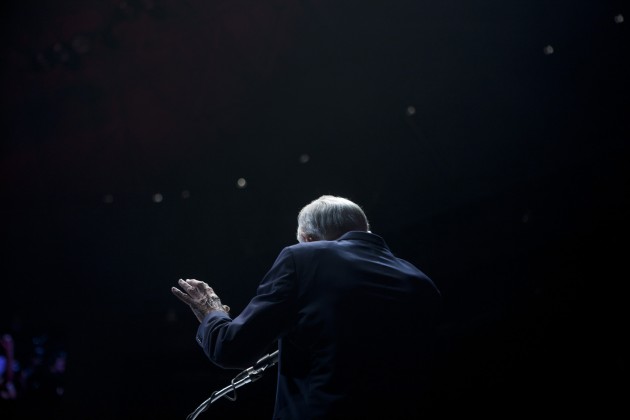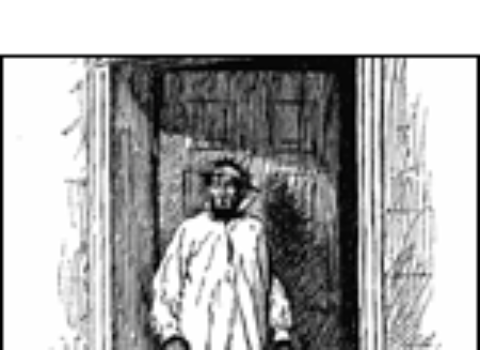On Rand Paul and the Libertarian–Statist Divide
Why establishment Democrats and Republicans fear Rand Paul

Independent presidential candidate Ron Paul holds a rally at the University of South Florida, in Tampa, the day before the 2012 Republican National Convention begins. Photograph © Christopher Morris/VII
When Rand Paul commandeered the senate floor last month to protest the government’s remote-controlled-death-machine program, he proved that distant political factions have more in common than we’re often led to believe. The antiwar left saw the filibuster as a challenge to the violence and the innocent dead left in the drone program’s wake. The antigovernment right rallied around Paul’s pointed question about whether a hypothetical Hellfire missile might just leave a crater where your neighborhood Starbucks once stood. Rush Limbaugh called him the future. Code Pink activists brought him boxes of chocolates. #StandWithRand was, for a moment, the most popular Twitter topic on the planet.
In this one act of political theater, Paul also accomplished what his father had been unable to do during thirty-seven years in politics: he brought an American Civil Liberties Union position into the Republican Party mainstream. But the stirring tale of Rand Paul, tousle-haired libertarian prince, didn’t last long. Even as Twitter carried on about his #PaulNighter, the adults in Washington came to the bipartisan consensus that the junior senator from Kentucky was out of his depth.
Republican senators John McCain and Lindsey Graham took the greatest umbrage and said, respectively, that Paul was a “wacko bird” and had the party “spun up” about nothing. Graham congratulated Obama on escalating the quasi-covert program that has now killed upward of 900 civilians in Pakistan and Yemen, including scores of children, while also noting that the process of putting people on the kill list is “sometimes too rigorous.” The Wall Street Journal cautioned Paul against pulling any more “stunts that fire up impressionable libertarian kids in their college dorms.”
The only faction more indignant than the establishment right was the establishment left. On The McLaughlin Group, Eleanor Clift described Paul’s filibuster as “a paranoiac rant.” MSNBC’s Lawrence O’Donnell called him “a crazy man,” “vile,” and, medically speaking, “a psychopath.” Lest the point be lost in nuance, O’Donnell summarized: “Rand Paul is not a flawed messenger on this subject; he is a ridiculous, sick, paranoid messenger.” Frank Bruni wrote in the New York Times that Paul is “loopy,” an “albatross,” a “curse,” and a “skunk” who is serving the American people “a crazy salad.”
What sort of strange creature is this? How did a psychopathic skunk-bird and his crazy salad make so many powerful people feel threatened? The answer is plain: Rand Paul is his father’s son, and regardless of the massive recent shift in public opinion about drones, Washington has not warmed to the Paul family’s fight against federal power. Rand may be the smoother messenger and the more willing to compromise of the two, but as Ron Paul’s biographer Brian Doherty told me, Rand “is living up to his father’s legacy in ways that are so significant . . . it’s surprising how much the Republican Party is rallying behind him.”
Rand is now the unquestioned leader of the nascent political movement that his father is still building, even after his January retirement from Congress. The self-described “Liberty Movement,” whose quasi-religious fervor I wrote about in the April issue of Harper’s, is powered by the same young apostles who have been carrying Ron Paul’s antigovernment, anticorporate, antiwar message since 2008. Paul may not have won a single state primary in his two recent presidential campaigns, but he did something that no Perry or Santorum could achieve: he laid an organizational groundwork with the potential to change the G.O.P. from the inside. He held a steady 10 percent of the vote during the 2012 primaries, and he raised more money than any candidate other than Mitt Romney. (He also took in more than seven times Romney’s total from members of the active military.)
Libertarian conservatives remain an insurgent minority in the party, but their momentum can no longer be questioned: Paulite Republicans control the state party chairmanships in the early-voting states of Iowa and Nevada. They are dominant in Maine, and are threatening establishment conservatives in Florida, Louisiana, Minnesota, Oklahoma, Virginia, and beyond. These gains have not been without considerable turmoil (and in some state conventions last summer, outright chaos), and they will test the party’s core beliefs. But at a time of conservative reassessment, the “Ron Paul people” are equally an opportunity to widen the party’s appeal — and Rand, Doherty says, “is explicitly and implicitly trying to reach out beyond the Republican Party base.”
Following the success of the drone filibuster, Rand gave an interview on Fox News Sunday that would have been unthinkable just a month prior. A “more libertarian Republican approach to things,” he said, could attract young voters and make the party competitive on the West Coast and New England. “Our party could grow if we accepted something a little different than the cookie-cutter conservative that we’ve put out in the past.” It’s an open play for fiscal conservatives who don’t mind gay marriage, but have soured on endless military adventurism.
The Obama Administration, too, has left a few doors open for Paul. For every drone-supporting Democrat who rests her conscience on Obama’s wise judgment, there are others who ask how President Palin would wield the same authority. Years of stagnant economic growth are applying additional pressure on today’s progressive coalition. “Reality,” says Doherty, “is making the libertarian case for the libertarians.” The successive crises of the past twelve years — 9/11 and its attendant wars, the surveillance state, a failed drug war, and the financial crisis — are eroding the structural narratives of American politics. The left-versus-right paradigm won’t fade overnight, but it is being joined by a new struggle that, on a variety of issues, pits populists who have grown skeptical of government’s ability to solve big problems against confident corporate and state planners. If Rand Paul and the Liberty Movement continue to challenge the Republican establishment on drones, drugs, and defense spending, and if the Democrats blithely carry on as champions of the status quo, this reshuffling can only gather speed. It may be starting on the local and state level, and it may not yet be finding expression in these terms, but the fight between the libertarians and the statists has begun, and it’s coming to an election near you.





